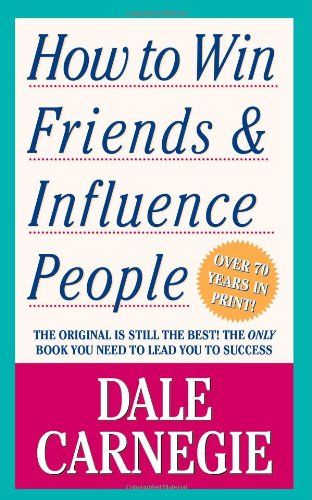By Dale Carnegie (1936)
Pages: 264, Final verdict: Must-read
Have you been hearing a lot about emotional intelligence lately? One could think this is a recent concept, by the way it is discussed nowadays, but Dale Carnegie already approached many of the issues of using your emotions for effective communication back in the early 20th century.
In this review we revisit the 1930's classic which has inspired multiple generations. How to Win Friends and Influence People is today still one of the best selling business books of all time. What are the lessons that Dale Carnegie brought us?
Simple rules for great relationships
Dale Carnegie ran courses on public speaking for business men and women in New York. Eventually, he realized that the ability to get along with other people at work was one of the most sought after skills by his students and decided himself to learn as much as possible on the subject.
Carnegie mentions to have personally interviewed thought leaders such as Edison, Marconi or even Franklin D. Roosevelt when doing the research for his course. Having written multiple other books, How to Win Friends & Influence People turned out to be the one which made Carnegie famous all over the world.
"We learn by doing. So, if you desire to master the principles in this book, do something about them. Apply these rules at every opportunity." - Dale Carnegie
In simple terms, Carnegie lays out a list of the principles in each of the four parts of the book which are organized in the following way:
- Fundamental Techniques in Handling People
- Six Ways to Make People Like You
- How to Win People to Your Way of Thinking
- Be a Leader: How to Change People Without Giving Offense or Arousing Resentment
The chapters of the book revolve around examples: from Queen Victoria to Napoleon, how an architect got a big order from Kodak's boss George Eastman by showing interest in his work or tricks of an automobile sales manager. These stories make it very easy to follow Carnegie's thoughts and make How to Make Friends & Influence People a very nice read.
The best way to win an argument is to avoid it
In each of the chapters, you can learn a lot from How to Win Friends & Influence People and the practical examples given in it. I won't tell you about all of them, you should read the book after all! So, from all the stories in the book I would like to focus on the ones I found the most interesting.
I am sure you witnessed the situation before: you're having dinner with friends when someone makes a claim about a certain fact and another one quickly jumps in to correct him. The discussion about who is right goes on for hours and both part unsatisfied and convinced only of their own certainty. If only one of them would concede that he is not always right... Dale Carnegie suggests we should not try to win arguments for the mere sake of proving ourselves right: we would be proving the other person wrong and that is not the best way of making friends.
If you want other people to listen to you, think about how your behavior will affect them and:
- Find common ground - show the other person that you care about his opinion by stating where you agree with him, before jumping to where you disagree. A great tip for facilitating discussions.
- Never make the other person loose face - no one likes to be proven wrong, so giving the other person a way of excusing himself will more quickly lead him to change his mind.
- Don't complain - who likes complaints? Instead, give praise and specific suggestions for improvement.
- Show sincere interest - remember the last time you enjoyed working with someone whom you did not trust? Don't be a puppet, but show your authentic self.
The last part of the book focuses more specifically on leadership skills. On the chapter No one likes to take orders, Carnegie suggests using questions instead of giving direct orders. One his suggestions is following your suggestions by the words "What do you think of this? (I use this question very often, also read it in the book by Tom Peters called The Little Big Things).
"People are more likely to accept an order if they had a part in the decision that caused the order to be issued." - Dale Carnegie
Other leadership tips include giving the other person a fine reputation that they feel motivated to live up to and pointing to problems in such a way that they seem easy to correct.
Finally, Carnegie leaves us with another fine piece of advise for all aspiring leaders: "Be sincere. Do not promise anything that you cannot deliver. Forget about the benefits to yourself and concentrate on the benefits to the other person."
Bottom Line
Dale Carnegie was a pioneer in the style which some would call 'self-help books'. How to Win Friends & Influence People might seem like a book for salesmen. But you can take these lessons well beyond that and use them to create healthy relationships will those around you.
One must keep in mind that many of the principles advocated in the book, stem from research in psychology, which is far more advanced today than back when Dale Carnegie wrote about it. Many of the examples are quite outdated and should not be applied literately. However, the main concepts behind them still stand: be thoughtful of others' points of view and work to improve your communication constantly.
How To Win Friends & Influence People is not about techniques for manipulating other people, but a set of tips and examples on how we can improve our social competences with empathy, compassion and emotional intelligence. If you aspire to be a leader at work, in your family or serve as an inspiration for others, this is one of the books that you must read.
Further Learning
- Buy the book online.
- Dale Carnegie Training - the training company that follows the legacy of Dale Carnegie
- Other books from Dale Carnegie:
- How to Stop Worrying and Start Living
- How to Develop Self-confidence and Influence People by Public Speaking
- The Quick and Easy Way to Effective Speaking



